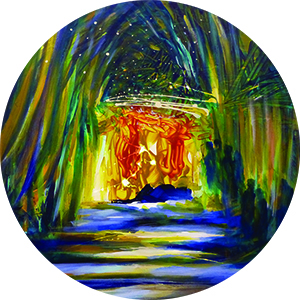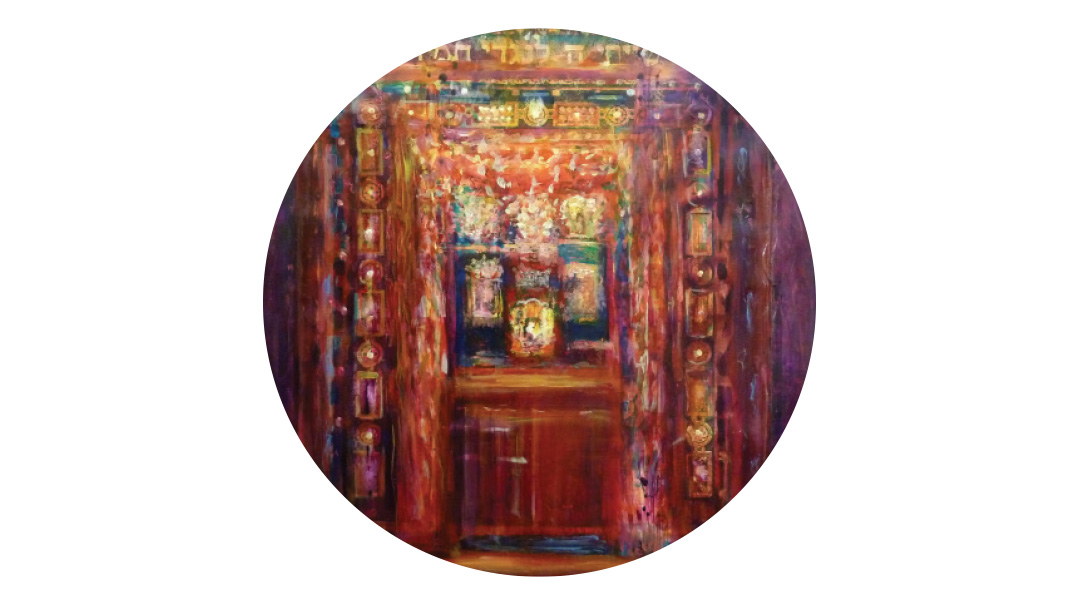Day of Yearning

What are we looking for? What do we really want? Hoshana Rabbah holds the key to the answer
W

Hoshana Rabbah holds the key to the answer.
Built for Action
It’s appropriate that most of our days are taken up with activity since humans were charged with a task right there in the Garden of Eden: “Fill and master the world” (Bereishis 1:28). Ask people to tell you about themselves and you’ll get a litany of actions — what they do in their professional life, how they keep themselves busy in their spare time, what good deeds they involve themselves in.
Human beings are built for action. We have both brain and brawn — as well as flexible thumbs and four other dexterous fingers. Adam Harishon was given all the tools he would need to get out there, fill the world, and develop it.
But that’s only one aspect of man — the part of him that’s obvious to the casual observer. There’s another part to Adam that many are oblivious to. That’s the hidden part — the heart stirred by mystery that senses the Hand behind all he sees and yearns to know Him. This is the part of man that seeks not control but connection — with both his fellow man and with his Creator.
Yes, our name is Adam. We were created from the earth and were charged to take care of it — “The heavens are G-d’s, but the earth was given to bnei Adam” (Tehillim 116). But that’s not the whole story. There’s another whole persona hidden in the word Adam. Externally we are doers, producers, and achievers, but, writes Sefer Benayahu, our inner self — our true self — is our yearning core.
This truth is hidden in the letters of the word Adam. The word Adam is spelled alef-daled-mem. To discover the inner essence of the word, you need to take each of those letters and spell them out.
Alef is spelled alef-lamed-pei. Daled is spelled daled-lamed-tav. Mem is spelled mem. If you take the “hidden” letters from the word “Adam” (the lamed and pei from the letter alef, the lamed and tav from the letter daled, and the mem from the letter mem), you get the world mispallel. The inner essence of man, then, is his prayer — his yearning for connection.
While external Adam is all geared up for self-sufficiency, prayer implies a lack. When you’re full to the brim, when everything is done, when you have everything you need, there’s no need to yearn and no need to pray.
In fact, the literal meaning of the name Eisav — the archetypical non-Jew — actually means “done.” Eisav isn’t into yearning or hoping; he has what he needs. Surprisingly, the word Eisav has the same gematria as the word peace, because the non-Jew is able to find an element of peace and wholeness in this world.
But not the Jew. The Jew is a mispallel. The face of the Jew is always turned upward in feminine yearning. His voice is the voice of Yaakov. He not only prays, but as Dovid Hamelech put it (Tehillim 109), he is prayer. His deepest essence is yearning for G-d.
It’s not easy to yearn, not easy to search — not only because it’s hard to be looking for something, but because searching makes you vulnerable. When you have all you need neatly packed in your pocketbook, you can stride out the door full of can-do and aplomb. When you’re sprawled on the floor peering under the couch looking for that extra key, not so much.
Searching for bigger things works the same way. There is vulnerability in looking, in yearning, in praying, or waiting for something. It means you’re lacking. You are not “sababa,” as Israelis would say. You’re not cool, you don’t have everything under control.
True Identity
This is why Hoshana Rabbah — the celebration of non-sababa-ness — is such a powerful day.
The object that takes center stage on Hoshana Rabbah is the simple aravah, the willow branch, the poor cousin at the wedding. The aravah is the only one of the Four Species that has no taste and no smell. The aravah has only one identifying feature: It only grows by the water, searching, always searching for some hydration.
The halachah is that for the special mitzvah of banging the aravah on Hoshana Rabbah, you can’t use the aravah from your daled minim. The aravah needed for Hoshana Rabbah can’t be the one that gained stature by the good company it kept all week, with the fragrant, delicious esrog; the ramrod-straight lulav; the pleasant-smelling hadas.
No, this has to be an aravah with not only no fragrance and no taste, but with no yichus either. This aravah finds no comfort in numbers, affiliation, or community. This aravah is so naked of any positive attributes that all it has to show for itself is its yearning for water, its desire to connect to good. How apt that the Ushpizin for Hoshana Rabbah is Dovid Hamelech, who despite the grandeur of his kingship, stood alone before G-d: “My father and my mother have abandoned me, and G-d has gathered me in” (Tehillim 27:10).
Water, Not Wine
All during the year, and especially in the past few weeks, we’ve presented before Hashem with our actions. We come lugging our sacks of hard-learned mitzvos. We got up early for Selichos, blew the shofar, smashed our thumbs while building our succahs, chose our daled minim. We cleaned and shopped, cooked and chopped. But all those actions are our outer persona, the conqueror, activist, doer, producer — Adam. There’s another side to the story.
Even as we lug in our sacks of mitzvos, deep down the words of the Selichos ring in our hearts: “What are we? What worth are our puny kindnesses, our measly strengths, our paltry righteousness?”
In a moment of truth, all our machinations and bluster, all our modest boasting, they all shrivel down to nothing. All that’s left is a person standing before his Creator saying, “Honestly, I’m not any great shakes. All I am is someone who wants to be close to You.”
All year long, the libations on the Mizbeiach were made with wine. Wine is produced with effort. The grapes are planted, tended, picked, threshed. Wine celebrates human skill and action.
But, says our Beloved in Shir Hashirim, “greater than wine is your love.” On Succos, the holiday of love, the libation is made with water, brought up from the depths of the Shiloach. After all the hoopla of the past few weeks, it’s water— simple, pure, flowing water — that washes over man’s bombastic boasting, his bluster and braggadocio, and reveals his pure, inner, praying essence.
And that pure inner essence, Sfas Emes explains, is greater than the “wine” of our actions. Tefillah l’ani ki yaatof. Hoshana Rabbah is the prayer of the poor person: no swagger, no bravado, just a simple, willow branch wrapped in prayer.
Hope Is a Line
The Hebrew word charging us to hope and yearn is kavei, which, interestingly, shares a root with the word kav, meaning straight line. Twice a day for the past few weeks, we’ve repeated this injunction of Dovid Hamelech: Kavei, hope toward G-d, strengthen and fortify your heart, and hope toward G-d.
Hope is delicate and easily trampled. It’s crushed by cynicism, it’s crushed by the cloying superficiality of our screen-obsessed culture, and it is crushed by the naysayer living in our own heart who rolls his eyes, sighs, and mutters, “Who do you think you’re kidding? Every year you say the same thing, and nothing ever changes.”
Hoping toward Hashem means drawing a line that reaches from our conflicted, discouraged hearts straight to the Heavens. No, we aren’t perfect. No, we aren’t tzaddikim. But Hoshana Rabbah tells us that it’s not our actions that define our essence; it’s the direction in which our faces are pointed.
Helpmate Opposite Him
Banging the aravah on Hoshana Rabbah is not a mitzvah in the Torah. It’s not even a halachah. It’s called a minhag Neviim, and yet it’s so important that the entire calendar is set up to ensure that Hoshana Rabbah does not fall out on Shabbos, which would prevent us from banging the aravah.
This seems baffling. The Jewish calendar allows Rosh Hashanah to fall out on Shabbos, even though that causes us to miss out on blowing the shofar on the first day of the Yom Tov, which is d’Oraisa. Succos can fall out on Shabbos, even though that means we miss out on taking the lulav, which is also d’Oraisa. Yet Chazal go to great lengths to orchestrate the calendar so we should never miss out on banging the aravah on Hoshana Rabbah. Why is this deemed so important?
Perhaps it’s because this custom reveals a deep secret of creation — that the purpose of the entire universe and everything in it, including me and you and everyone else — is love. And for love, you need yearning.
Hashem, our Master, our Father, and our King has left one small area out of His jurisdiction, and that is our hearts. With all of the abundance, bounty, and blessing Hashem has to bestow upon us, if we do not open our hearts, if we do not carve out an empty space by yearning and hoping and praying, there’s no room for Him in our lives.
In a fascinating insight, the seforim tell us that the word aravah has the same gematria as the word ezer. Just like a woman is the ezer k’neged her husband — her yearning for him is the catalyst that actualizes their relationship — so, too, the yearning of the Jew for Hashem opens up the door for Him to interact with us.
It’s when the receiver opens herself up to connection that a bond (me’urav, from the same root as aravah) is created between the giver and the receiver.
The word aravah also shares a root with areiv, which means sweetness. While the aravah may have nothing much to show for itself, there’s an irresistible sweetness in opening oneself up to love.
True love — true connection between the giver and the receiver — always produces offspring. Sometimes the offspring are physical children, while other times offspring exist only in the spiritual realm.
Interestingly, the word ezer, helpmate, can be flipped to read zera, offspring. From Hoshana Rabbah, the day of connection, we move into the intimate joy of Shemini Atzeres, the day on which nations of the world go home, and it’s just us and Hashem rejoicing in the Torah — the Written Law that comes from Above and the Oral Law that emanates from us below.
The Heart Is Spontaneous
Succos is one of those interesting words whose meaning encompasses two opposites. Succah means to cover, as in the word sechach, and it also means to see from afar, as in socha. (See Hipuch Osiyos, Kulmus Publications) Perhaps this is because covering some things leads to the revelation of others.
The feminine persona in Judaism is often looked down upon by Western sensibilities. Why do women have fewer commands and obligations in Judaism?
Yet when we move into the embracing, womb-like hold of the succah, we discover truths that might not be accessible out in the great, wide world. Obligations have their place for both women and men, but so does the spontaneous response of the heart. In general, the man’s role in Judaism is a metaphor for the action-oriented, command/obligation mode of Judaism, whereas the woman’s role represents the inner feelings that both men and women need to spend their lifetime cultivating.
Actions can be commanded, feelings evolve. The minhag of banging the aravos, the willow leaves — which Chazal point out are shaped like lips — is not something Hashem commanded us to do. The banging of the aravos, pushing away all that divides us and Hashem and then lifting the aravah upward as if in a kiss to Hashem, is something the Jewish People took upon themselves. It’s symbolic of the feminine aspect of Judaism — the yearning, the prayer, and the spontaneous, voluntary, heartfelt desire for a relationship with Hashem.
For many women, Hoshana Rabbah, positioned as it is at the end of a week of nonstop cooking and cleaning, with its demand of its own seudah despite the fact that it’s also Erev Yom Tov, is not necessarily a day we associate with great spirituality. But it’s here, in this whirlwind of activity, that the truth lies.
Even if we don’t make it to shul, we can still tap into the pure, refreshing shower of love, where the question asked is not about what you did, but who you are: Have you made your dwelling place close to a source of water? Was your face turned upward toward the source of life? Beyond your actions, where is your heart?
Miriam Kosman is a lecturer for Nefesh Yehudi and teaches Jewish thought to hundreds of Israeli university students each week. In addition, she teaches a Nefesh Yehudi kiruv training course in Jerusalem and is the author of Circle, Arrow, Spiral: Exploring Gender in Judaism.
(Originally featured in Family First, Issue 663)
Oops! We could not locate your form.






